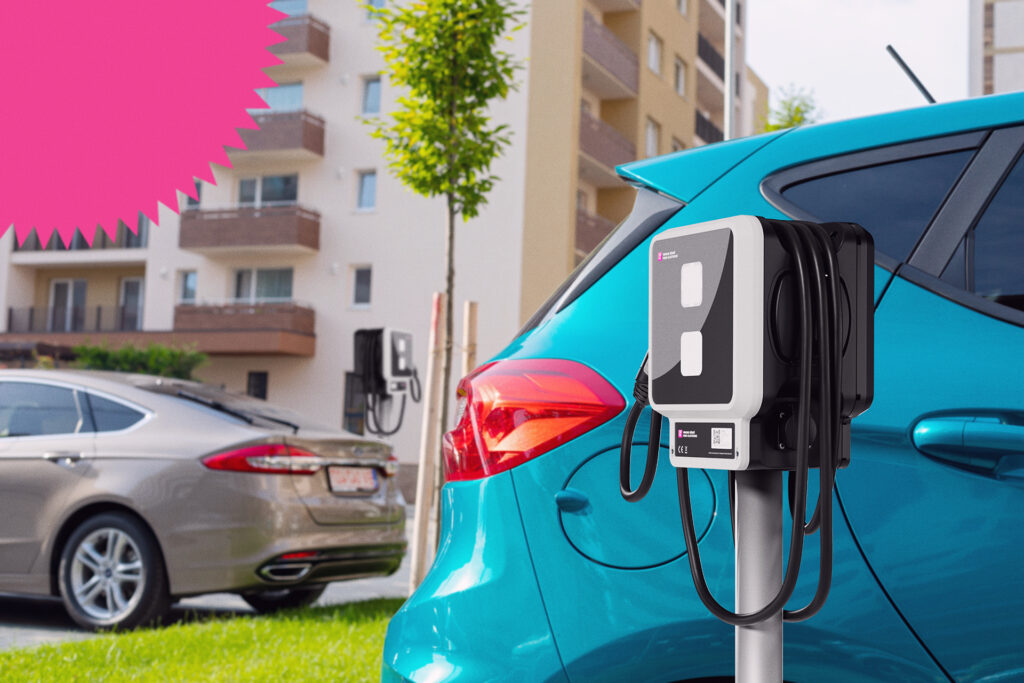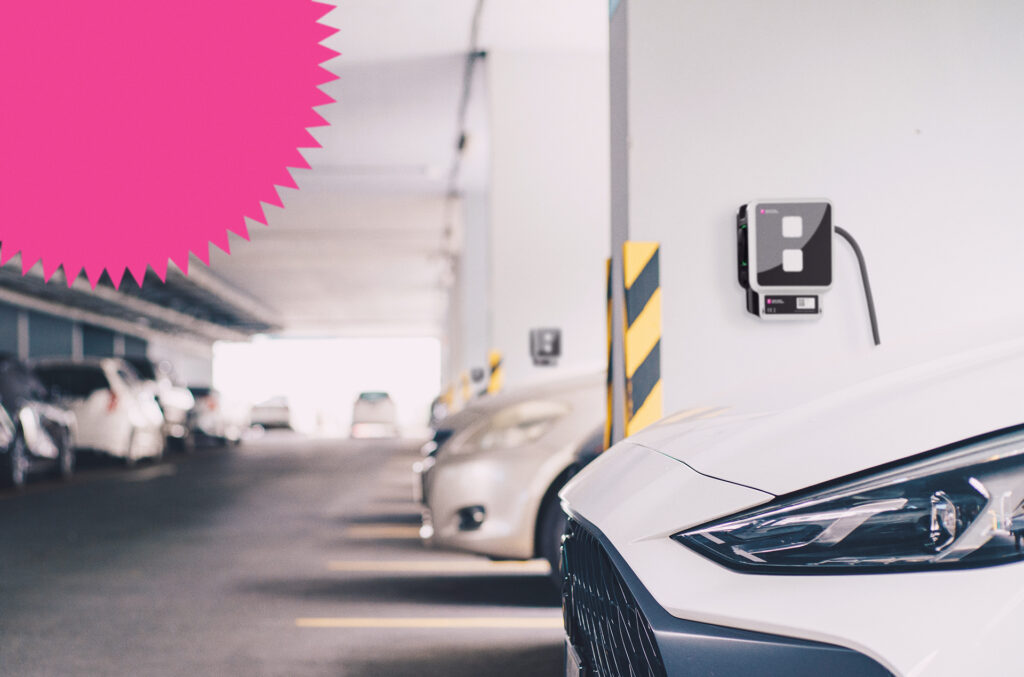Electric car charging station – buyer’s guide
Considering an electric vehicle charging station for your home? Read our comprehensive guide on why and which charging device to choose, and which one is the best fit for you.
buyer’s guide
When purchasing an electric vehicle or plug-in hybrid for your home, it’s worth investing in a high-quality charging station. With that you can charge your car safely and quickly, without having to wait for your turn at public charging points.
With home charging, you only pay for the electricity you use and the electricity distribution, making it the most cost-effective option with your own charging device.
Public charging point providers include additional costs in their pricing, which often makes using a public EV charger more expensive.
Affordable charging with spot-priced electricity
- The cheapest driving kilometers are charged at home when electricity is cheap on the spot market. This is typically at night or on windy days, when there’s plenty of affordable wind power available.
- To take advantage of market price fluctuations, you need to sign a exchange electricity contract for your home.
- Exchange electricity is at its cheapest when the market gets a lot of wind power and/or consumption is low.


Smart charging device with price optimization
A smart charging device optimizes charging based on other consumption in the household – but also the price of electricity.
buyer’s guide
How much does an electric car charging station cost?
The prices of charging devices range from around € 200 to € 2,000. The cheapest and most expensive chargers are not really comparable.
Travel charger for occasional use
For a few hundred euros, you can get what’s called a travel charger, or a cable used to charge the car from a regular power outlet.
A travel charger is recommended only for occasional use, as power outlets are not designed for continuous, long-term loading.
The effect of a travel charger is usually 3.7 kilowatts, and the charging is slow. Charging a fully electric car (battery size 77 kW) from 5 percent to 80 percent would take 16 hours with a travel charger.
Fixed charging station: charge the battery quickly and safely
The more expensive chargers are fixed charging stations, which are installed either on the building’s wall or on a heating pole.
These allow the car to be charged quickly and safely. The charging effect in home chargers typically ranges from 11 to 22 kilowatts.
Charging a fully electric car (battery size 77 kW) from 5 percent to 80 percent would take 5 hours with a fixed 11-kilowatt charger.
Fixed charging station for homes – how to choose the right one
When looking for a fixed electric car charging station for your home, pay attention to the following:
- Is the vendor reliable, such as a well-established and reputable online store or energy company?
- Is the manufacturer, for example, a Finnish company?
- Does the seller communicate openly about sustainability matters? Can you find information about where the charging device is manufactured and how environmental factors have been taken into account in its production?
- Does the vendor promise automatic software updates for the device?
- Can the device be controlled via an app? Does the app seem user-friendly?
- Does the device have automation and can it be controlled remotely?
- Is the charger a fixed 11–22 kilowatt charger that allows fast charging at home?
- Can you choose between a fixed charging cable and a Type 2 connector?
- Smart charging stations are slightly more expensive than “dumb” charging devices, but with a smart device, you can achieve savings in energy costs over the device’s lifespan.
Choosing the effect of the electric car charging device
The chargers used in households are usually 11 kilowatts or 22 kilowatts. A device with double the effect means half the charging time. However, a faster charger is not always a better option.
The effect of an electric car charging device is limited by the size of the household’s main fuse: You can check the size of the main fuse in your electrical panel.
- Typically, single-family homes have a 3 X 25 ampere main fuse. For these locations, an 11-kilowatt charger is the best option, as a 3 x 25 A fuse provides about 17.2 kilowatts of power. A 22-kilowatt charger cannot provide full effect. It is still an option, but it should have dynamic load management.
- If the main fuse is 3 x 32 amperes or higher, a 22-kilowatt charging device can be installed. A 3 x 32 A fuse provides 22 kilowatts of power. It is recommended to purchase a device with dynamic load management, so the fuse does not overload, even if other electrical devices are in use while the car is being charged.
The maximum AC charging power of the car also sets limits on the charging speed:
- If the maximum AC charging power is 11 kW, the car cannot be charged with a device that has a higher effect than that. You won’t benefit from a more powerful charger.
- If the car’s maximum AC charging power is 22 kW, it can be charged with a 22-kilowatt home charger at twice the speed of an 11-kilowatt charger.
Note! AC charging power applies only to home charging, not so-called fast chargers. Public charging stations have higher DC fast chargers, while home charging stations provide AC power.
Fixed charging cable or charging connector?
You can choose either a fixed charging cable or a Type 2 charging connector, from which the car is charged with a separate charging cable. All electric cars sold in Europe are compatible with the Type 2 connector.
Some find a fixed charging cable more convenient, while others choose the wireless option for aesthetic reasons.
The best electric car charger is smart
A smart electric vehicle charger makes charging your car affordable, effortless, and safe. Note that the features of chargers from different manufacturers may vary.

Smart electric car charger
Smart electric car charger is worth it – 5 reasons
- Savings: The smart charger schedules charging based on the spot electricity price, saving on your energy bill.
- Mobile app: Control the charger and monitor home electricity consumption through an app.
- Dynamic load management: Protects your home’s electrical system from overload, preventing fuse blowouts.
- Protected charging: Charge initiation is only allowed through the app, protecting the device from unauthorized use.
- Smart charging: The charger monitors the temperature of the charging connector and includes built-in residual current protection.
Note: The smart charger does not require an internet connection to function. So, you can purchase it even if you don’t have a wireless Wi-Fi network at home.
Dynamic load management makes charging hassle-free
Dynamic load management is one of the most desired features of a smart charger. That’s why we offer a wireless load management module with the charger if desired. Not all chargers support this feature, or it might be expensive to install separately. Without load management, the maximum charging power has to be significantly limited to ensure that the main fuses can handle the load in all situations. This means the full power of the charger isn’t fully utilized.
Dynamic load management optimizes charging power automatically based on the available electricity in the property. This way, the full capacity of the property can be used without overloading the system.
For example, if the sauna, oven, and washing machine are in use, the charger won’t charge at full power simultaneously but will adjust the charging to ensure the main fuse isn’t overloaded. Without load management, the maximum charging power must be restricted, meaning the full potential of the charger is underutilized.
Electric car charger installation
The charging station is installed near the car’s parking space, either on the wall of your home or garage or on a parking pole.
If you have a combustion engine car as a second vehicle, its heating can also be managed via the charger.
There are typically no major size differences between fixed charging stations.
The device’s IP54 rating indicates weather resistance, meaning it can be safely installed outdoors.
Professional installation only
Installation must be done by a certified electrician. A professional will install the device safely and ensure its proper functioning.
The installation usually takes about 1–4 hours, provided the installer has received the necessary information about the site beforehand and there are no surprises during installation.
The charger is connected to the home’s main electrical panel with a cable. In wall installations, the cable is run along the wall from the charger to the main electrical panel. For pole installations, a trench is dug for the cable.
The charger is connected behind its own fuse in the home’s main electrical panel. If there is no room for additional fuses in the electrical panel, additional space can be created or a different setup may be needed.

Electric vehicle charging station for your housing company
If you want an electric vehicle charging station for your housing company, contact the housing association’s board or property manager. They will initiate the process of acquiring charging points for the building.
It’s advisable for the housing company to consult with professionals to assess installation options. This assessment will determine how many charging stations the building’s current electrical system can support.